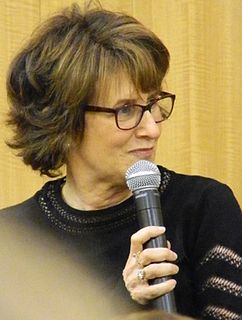A Quote by Ellen Ullman
The messiness cannot go into the program; it piles up around the programmer.
Related Quotes
The programmer, who needs clarity, who must talk all day to a machine that demands declarations, hunkers down into a low-grade annoyance. It is here that the stereotype of the programmer, sitting in a dim room, growling from behind Coke cans, has its origins. The disorder of the desk, the floor; the yellow Post-It notes everywhere; the whiteboards covered with scrawl: all this is the outward manifestation of the messiness of human thought. The messiness cannot go into the program; it piles up around the programmer.
When we take the position that it is not only the programmer's responsibility to produce a correct program but also to demonstrate its correctness in a convincing manner, then the above remarks have a profound influence on the programmer's activity: the object he has to produce must be usefully structured.
Science does not rest upon solid bedrock. The bold structure of its theories rises, as it were, above a swamp. It is like a building erected on piles. The piles are driven down from above into the swamp, but not down to any natural or 'given' base; and if we stop driving the piles deeper, it is not because we have reached firm ground. We simply stop when we are satisfied that the piles are firm enough to carry the structure, at least for the time being.
In this respect a program is like a poem: you cannot write a poem without writing it. Yet people talk about programming as if it were a production process and measure "programmer productivity" in terms of "number of lines of code produced". In so doing they book that number on the wrong side of the ledger: we should always refer to "the number of lines of code spent".
I studied physics at Princeton when I was a college student, and my initial intention was to major in it but to also be a writer. What I discovered, because it was a very high-powered physics program with its own fusion reactor, was that to keep up with my fellow students in that program I would need to dedicate myself to math and physics all the time and let writing go. And I couldn't let writing go, so I let physics go and became a science fan and a storyteller.
Pinball games were constrained by physical limitations, ultimately by the physical laws that govern the motion of a small metal ball. The video world knows no such bounds. Objects fly, spin, accelerate, change shape and color, disappear and reappear. Their behavior, like the behavior of anything created by a computer program, is limited only by the programmer's imagination. The objects in a video game are representations of objects. And a representation of a ball, unlike a real one, never need obey the laws of gravity unless its programmer wants it to.
I don't go into hysterics or anything, but I look around for something to smash it with. I used to live out in the country when I first moved here, and there were a lot of centipedes in the house, and I set out to kill them all. A program of genocide. I'd wake up in the middle of the night, and I'd know there's a centipede in this room. And there always was. And I couldn't go to sleep until I killed it.































